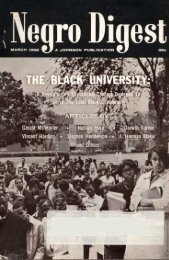3. Strain, Christopher Barry. “Civil Rights and ... - Freedom Archives
3. Strain, Christopher Barry. “Civil Rights and ... - Freedom Archives
3. Strain, Christopher Barry. “Civil Rights and ... - Freedom Archives
Create successful ePaper yourself
Turn your PDF publications into a flip-book with our unique Google optimized e-Paper software.
with him when he was here ."~ 4 The spectacle of armed black men going to the polls wa:<br />
not wasted on Carmichael, who began to think about the implications of power, <strong>and</strong> about<br />
what this concept really meant .<br />
When Carmichael <strong>and</strong> Willie Kicks introduced (or, more accurately, resunated)<br />
the phrase "Black Power" at the 1966 Meredith March, they "touched a nerve in a very<br />
nervous white America." is<br />
Carmichael, who would later pionar SNCC's merger with the<br />
Panthers in early 1968, tapped the same reservoir of white fear that Robert Williams <strong>and</strong><br />
the Deacons for Defense <strong>and</strong> Justice had tapped, though again, whites largely<br />
misunderstood the concept of Black Power. For most blacks, the appeal of Black Power<br />
lay in its excitement <strong>and</strong> energy, not its threat. Linda Bryant Hall, a young activist, noted<br />
that Carmichael "came with the same kind of energy Malcolm X came with . That's what<br />
we liked, not that we wanted to overthrow our government . . . <strong>and</strong> not that we wanted to<br />
~4Jackson, interviewed by Wright, August 3,1968.<br />
is As the Meredith March progressed, Kicks began to promote the slogan "Black<br />
Power'; it was Carmichael's use of the phrase at a rally in the latter stages of the March<br />
that electrified the media <strong>and</strong> popularized the phrase . As Clayborne Carson has pointed<br />
out, "nicks provided Carmichael with a new weapon in his ideological swggle with King<br />
when he demonstrated the enormous appeal of the slogan `Black Power'--a shortened<br />
version of `black power for black people,' a phrase used by SNCC workers in Alabama."<br />
"Black Power" had been used before as a political expression . Novelist Richard Wright<br />
used "Black Power" as the title of his book on African politics written in the 1950s .<br />
Black activist Paul Robeson spoke of black power during the 1950s, as did Harlem<br />
political leaders Jesse Gray <strong>and</strong> Congressman Adam Clayton Powell even earlier. "But<br />
combined with Kicks' infxtious contempt for Mississippi's white authorities," Manning<br />
Marable has observed, "<strong>and</strong> in the context of the Meredith March, the slogan captuc+ed the<br />
mood of the majority of CORE <strong>and</strong> SNCC activists <strong>and</strong> most rural blacks as well ."<br />
Carson,~, 209; Manning Marable, Race. Reform <strong>and</strong> Rebellion (Jackson :<br />
University Press of Mississippi,1984), 104 .<br />
15 6
















